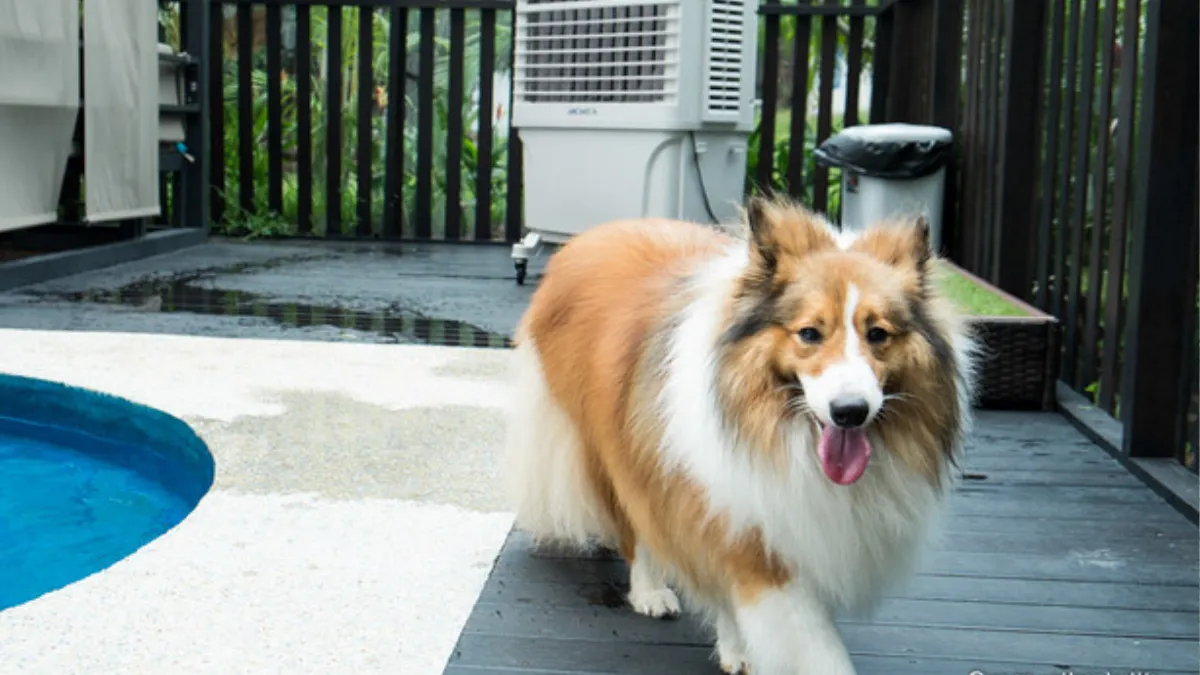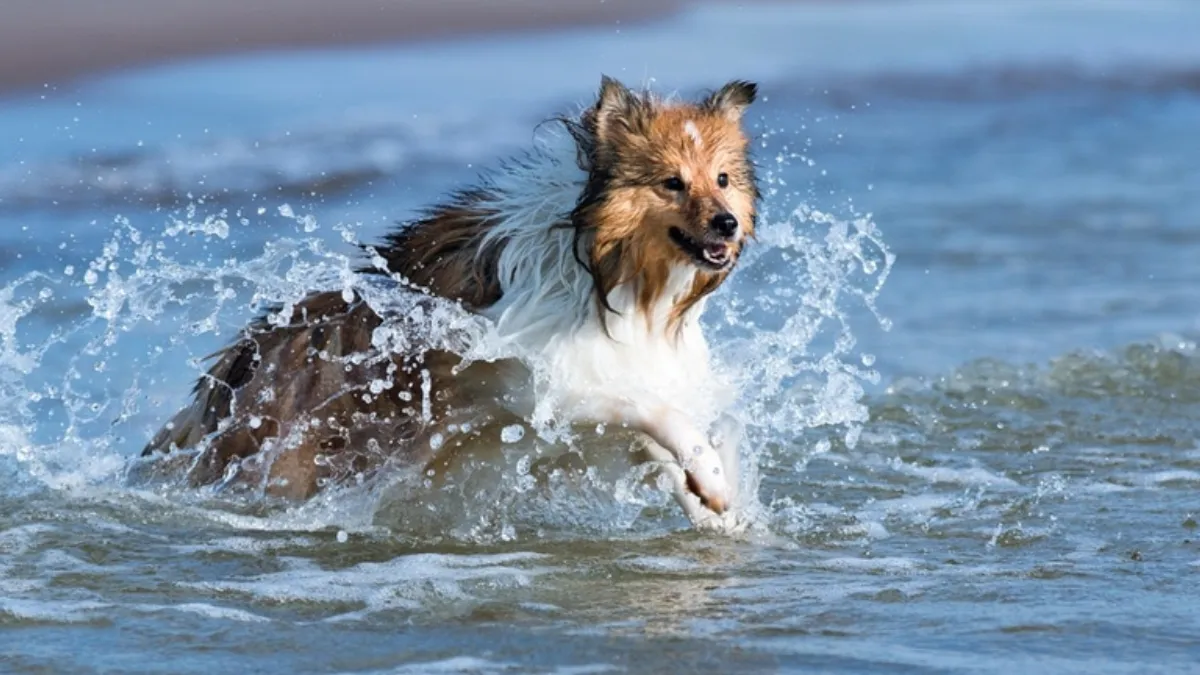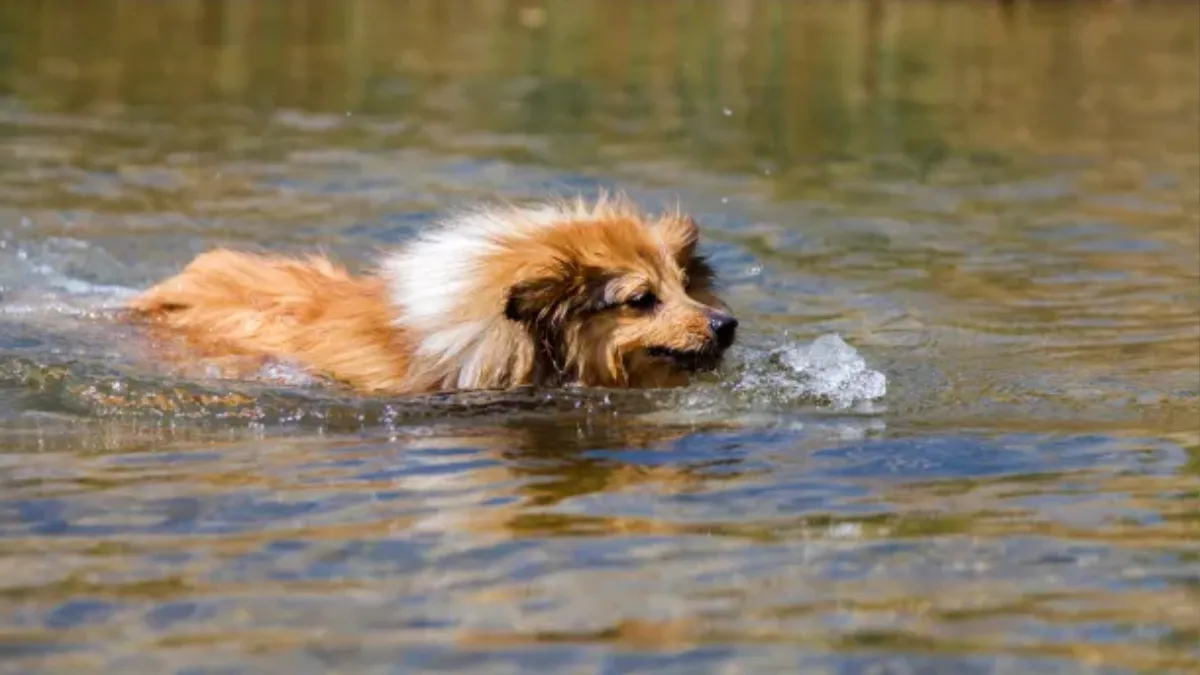Shetland Sheepdogs, commonly referred to as Shelties, are a favored breed of herding dogs, celebrated for their intelligence, agility, and unwavering loyalty. Nonetheless, many ponder whether these canines possess swimming abilities. This query holds significance, particularly for individuals residing near water bodies or indulging in aquatic pastimes with their furry companions. Can Shetland Sheepdogs Swim?
The answer to whether or not Shetland Sheepdogs can swim is not a straightforward one. Some Shelties are natural swimmers and enjoy spending time in the water, while others may be hesitant or even afraid of it. It ultimately depends on the individual dog's personality and experiences with water. It is important to note that just because a dog is a certain breed does not mean they will automatically be good at swimming.

Breed Overview
Origin and History
The Shetland Sheepdog, also known as the Sheltie, is a small herding dog breed that originated in the Shetland Islands of Scotland. They were developed from the Rough Collie and other small breeds, such as the King Charles Spaniel and the Pomeranian.
Shetland Sheepdogs were initially bred for their herding abilities, which included driving livestock and protecting them from predators. They were also used as watchdogs and companions.
Physical Characteristics
Shetland Sheepdogs are a small to medium-sized breed, with a height of 13 to 16 inches (33 to 41 cm) and a weight of 15 to 25 pounds (7 to 11 kg). They have a double coat that comes in various colors, including sable and blue merle.
The coat of a Shetland Sheepdog is long and thick, with a soft undercoat and a harsher outer coat. They shed moderately throughout the year and heavily twice a year during shedding season.
Overall, Shetland Sheepdogs are an intelligent, loyal, and affectionate breed that makes excellent companions for families and individuals alike. While they may not be known for their swimming abilities, they are still a beloved breed that has captured the hearts of many dog lovers around the world.
Sheltie Temperament
Shetland Sheepdogs, or Shelties, are known for their friendly and gentle temperament. They are highly intelligent dogs and are known for their loyalty to their owners. Shelties are also very vocal and tend to bark excessively.

Personality Traits
Shelties are affectionate and friendly dogs that love to be around people. They are known for their gentle nature and are great with children. Shelters have a strong herding instinct and may try to herd children and other animals. They are also highly intelligent and can be trained to do a variety of tasks.
Behavior with Children and Strangers
Shelties are generally friendly with children and enjoy playing with them. However, they may try to herd them, which can be a problem if the dog is not properly trained. Shelties are also friendly with strangers but may be wary of them at first. They are loyal to their owners and will protect them if they feel threatened.
In conclusion, Shelties are known for their friendly and gentle temperament. They are highly intelligent and have a strong herding instinct. Shelties are great with children and are generally friendly with strangers. However, they can be very vocal and may bark excessively if not properly trained.
Health and Care
Exercise Requirements
Shetland Sheepdogs are active dogs that require regular exercise to stay healthy and happy. They enjoy running and playing, and a daily walk or jog is recommended to keep them in good shape. It is important to note that Shetland Sheepdogs are not strong swimmers and should not be left unattended near water.
Grooming and Shedding
Shetland Sheepdogs have a double coat that requires regular brushing to prevent matting and tangling. They shed moderately throughout the year and heavily twice a year during shedding season. Regular grooming and brushing can help reduce shedding. Bathing and trimming should be done as needed, but not too frequently as it can strip the natural oils from their coat.
Common Health Problems
Like all breeds, Shetland Sheepdogs are prone to certain health problems. Some of the most common health issues in Shetland Sheepdogs include hip dysplasia, eye problems, and allergies. It is important to keep up with regular vet check-ups and to address any health concerns promptly. A healthy diet and regular exercise can also help prevent many health problems.

Overall, Shetland Sheepdogs are a relatively healthy breed with a few common health issues. With proper care and attention to their exercise, grooming, and health needs, they can live long and happy lives.
Training and Intelligence
Shetland Sheepdogs are highly intelligent dogs that are easy to train with patience and consistency. They are known for their obedience and eagerness to please, making them a great choice for first-time dog owners.
Teaching Commands
When it comes to training, Shetland Sheepdogs respond well to positive reinforcement techniques. This means that they are more likely to repeat a behavior if they are rewarded for it. Using treats, praise, and playtime as rewards can be an effective way to teach your Sheltie new commands.
It is important to start training your Sheltie from a young age, as this will help them develop good habits early on. Some basic commands that you can teach your Sheltie include "sit," "stay," "come," and "heel." Once they have mastered these commands, you can move on to more advanced tricks and obedience training.
Mental Stimulation and Socialization
In addition to obedience training, Shetland Sheepdogs also require mental stimulation and socialization to thrive. Mental stimulation can come in the form of puzzle toys, interactive games, and training exercises that challenge their minds.
Socialization is also important for Shetland Sheepdogs, as they can be wary of strangers if they are not properly socialized. Exposing your Sheltie to different people, places, and situations can help them become more confident and well-adjusted.
Overall, Shetland Sheepdogs are intelligent and trainable dogs that respond well to positive reinforcement techniques. With patience and consistency, you can teach your Sheltie a variety of commands and tricks, while also providing them with the mental stimulation and socialization that they need to thrive.
Shelties and Water Activities
Shetland Sheepdogs, or Shelties, are known for their agility and energy. While they may not be the first breed that comes to mind when you think of water activities, they can certainly enjoy swimming and other water exercises with proper training and guidance.
Can Shelties Swim?
Yes, Shelties can swim and are natural paddlers. However, not all shelters are comfortable in the water, and some may even have a fear or anxiety towards it. It is important to introduce them to water gradually and positively to help them build confidence and enjoy the benefits of swimming.
Introducing Shelties to Water
To introduce Shelties to water, start with shallow water and encourage them to enter the water on their own. Use positive reinforcement such as treats and praise to encourage them to swim. It is important to never force them into the water as it can create a negative association with water activities.

Safety Measures and Tips
When swimming with Shelties, safety should always be a top priority. Here are some tips to ensure a safe and enjoyable experience:
- Use a life jacket, especially for Shelties who are not confident swimmers.
- Rinse your Sheltie with fresh water after swimming in a pool to remove any chlorine or conditioner residue.
- Avoid swimming in lakes or bodies of water with strong currents or long distances.
- Monitor your Sheltie's energy levels and take breaks as needed to prevent exhaustion.
- Be aware of any joint issues your Sheltie may have and adjust the intensity of the exercise accordingly.
By following these tips and introducing Shelties to water positively and gradually, they can enjoy the benefits of swimming and water exercises while reducing stress and improving their overall health.
Herding and Other Activities
Herding Traits
Shetland Sheepdogs, commonly known as Shelties, are herding dogs that were originally bred to herd sheep and other livestock in the Shetland Islands of Scotland. They are known for their intelligence, agility, and energetic nature, which make them excellent herding dogs. Shelties have a strong instinct to herd, and they are quick learners, making them easy to train for herding activities.

Shelters have a natural ability to control the movement of livestock, and they use their keen sense of hearing and sight to keep the animals in line. They are also known for their ability to anticipate the movements of the livestock, which helps them to stay ahead of the herd and guide them in the right direction.
Participation in Dog Sports
In addition to herding, Shelties are also popular in a variety of dog sports, including agility and rally. These activities allow Shelties to use their natural athleticism and intelligence in a fun and challenging way. Shelties are also known for their love of fetch, which can be a great way to provide them with exercise and mental stimulation.
Shelties are energetic dogs that require regular exercise and mental stimulation to stay healthy and happy. Herding and other activities can be a great way to provide them with the exercise and mental stimulation they need. However, it is important to remember that not all shelters are interested in herding or other dog sports. It is important to work with your Sheltie to find activities that they enjoy and that are appropriate for their temperament and abilities.
Overall, Shelties are versatile dogs that excel in a variety of activities, including herding, agility, rally, and fetch. With their intelligence, athleticism, and energetic nature, they are well-suited for a variety of working and sporting activities.
Interaction and Social Traits
Shetland Sheepdogs, or Shelties, are known for their friendly and affectionate nature. They are highly sociable and enjoy interacting with their owners and other pets. They are gentle with children and strangers and are generally not aggressive towards other animals.
With Other Pets
Shelties are known to get along well with other pets, including cats and other dogs. They are not known to be dominant or aggressive towards other animals, but they may become territorial if they feel threatened or if their space is invaded.

Response to Training and Commands
Shelties are highly intelligent and respond well to training and commands. They are eager to please their owners and are known to be very loyal. They are sensitive to their owner's tone of voice and body language and can be easily trained with positive reinforcement techniques such as treats and praise.
Shelties are also known for their barking tendencies and may bark excessively if not properly trained. It is important to train them to control their barking and to use a lead when walking them in public places.
Overall, shelters are friendly and sociable dogs that make great pets for families. They are loyal and protective of their owners and respond well to positive reinforcement training techniques.
Adopting a Sheltie
If you're considering adopting a Sheltie, there are a few things you should keep in mind to ensure that you're providing the best possible home for your new furry friend. Here are some tips to help you get started.
Choosing a Sheltie Puppy
When choosing a Sheltie puppy, make sure to do your research and find a reputable breeder. Look for a breeder who is knowledgeable about the breed and who can provide you with information about the puppy's parents and health history. It's also important to meet the puppy's parents if possible to get an idea of their temperament and personality.
When you go to pick out your puppy, pay attention to their behavior. Look for a puppy who is friendly, curious, and playful. Avoid puppies who seem shy or aggressive, as they may be more difficult to train and socialize.
Preparing Your Home
Before bringing your new Sheltie puppy home, make sure to prepare your home for their arrival. Shelties are active dogs who require plenty of exercise, so make sure you have a yard or access to a nearby park where they can run and play.
You'll also want to make sure your home is safe for your new puppy. Shelties are curious dogs who love to explore, so make sure to keep any hazardous items out of reach. You may also want to invest in some toys and puzzles to keep your puppy entertained and mentally stimulated.

In terms of training and care, shelters are relatively easy to train and maintain. They are intelligent dogs who love to please their owners, so positive reinforcement training methods tend to work best. Regular exercise and grooming are also important to keep your Sheltie happy and healthy.
Overall, adopting a Sheltie can be a rewarding experience for both you and your new furry friend. With proper training, care, and attention, your Sheltie can be a loyal and loving companion for many years to come.
Conclusion:
In conclusion, Shetland Sheepdogs, or Shelties, can swim and enjoy it. Can Shetland Sheepdogs Swim? With proper training and supervision, they can become proficient swimmers.
It is important to note that not all Shelties may love swimming, and some may even be afraid of the water. As with any activity, it is important to consider the individual dog's personality and preferences before introducing them to swimming.
Overall, Shelties can benefit from swimming as it provides low-impact exercise that can improve their cardiovascular health and help them maintain a healthy weight. It can also be a fun activity for both the dog and their owner to enjoy together.
In summary, while not all Shelties may be natural swimmers, with proper training and supervision, they can learn to swim and enjoy the benefits of this activity.




